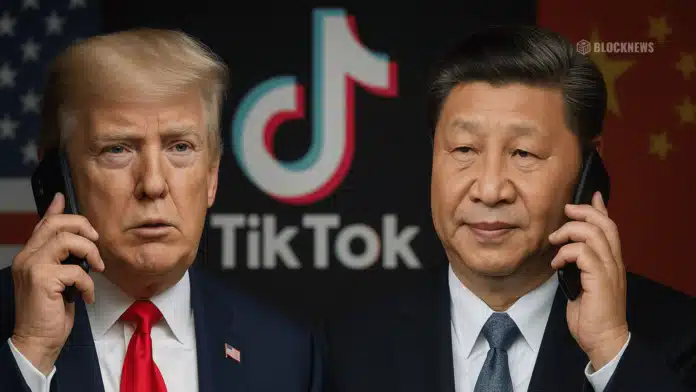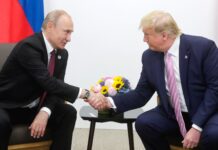The second of two articles on the ongoing trade standoff between the two biggest imperialist powers, China and the US
Vincent Kolo, chinaworker.info
The TikTok deal – if there will be a deal – is an important element in the wider conflict between Donald Trump’s government and the Chinese regime. Using a military analogy, we can say it is an important battle in the bigger US-China war. The Chinese-owned short video app with 170 million users in the US, was due to be banned on 17 January under a law passed by Congress in April 2024.
Trump vowed to save TikTok “for the kids”. He has postponed the ban four times and set about brokering a deal to bring it under US corporate ownership, a process that has dragged on for nine months. The US security establishment, Democrats and many Republicans are sceptical to any deal on “national security” grounds, pointing to the huge volume of user data which is currently controlled by TikTok’s Chinese parent company ByteDance, as if such data is safer in the hands of ‘local’ billionaires such as Musk, Zuckerberg or Larry Ellison.
Following a phone call with Xi Jinping on 19 September, which reportedly gave the Chinese leader’s go ahead for a TikTok sale, Trump signed an executive order on 25 September for the company to be taken over by a consortium led by pro-Trump billionaire Ellison. Trump wants to gain de facto political control of TikTok and use it as a powerful propaganda service for his rule.
But the devil as they say is in the detail. Despite Trump’s executive order, further wrangling, even a complete breakdown, may lie ahead. On the day of Trump’s executive order Vice President Vance admitted there was “some resistance on the Chinese side”.
It was clear from the fourth round of US-China trade talks in Madrid in September that TikTok has become the immediate focus for Trump. He is under pressure to show a concrete accomplishment after months of slow-motion negotiations, which give the impression Washington is being played by the Chinese regime.
How can one company, one social media app, be so important? The CCP hopes to use TikTok as a sacrifice to extract more important concessions from the US side: tariff relief, relaxation of tech controls, possibly even geopolitical concessions. By making a deal difficult and dragging out proceedings they hope to exact a higher price from Trump, whom they sense badly wants this deal.
So, what has Xi Jinping agreed to? The CCP’s media insists a TikTok deal must be “according to Chinese laws” and – crucially – that ByteDance i.e. the CCP will still control TikTok’s algorithm; the new US-owned entity will have “Chinese characteristics” they say. Trump however says TikTok’s algorithm will be “100% MAGA”. Clearly someone is not telling the truth.
Under the deal as so far reported there is significant scope for new conflicts to erupt even after TikTok is sold. The new US-owned Tiktok will not control the app’s algorithm outright, only a licensed copy. It will depend on China for necessary updates, giving the CCP a significant level of continued control. According to Angela Huyue Zhang in the South China Morning Post (28 September): “China could delay or withhold licensing approvals, using TikTok as yet another bargaining chip. In this way, the platform has been transformed into a powerful instrument of Chinese statecraft.”
Naturally, both regimes have political and strategic reasons to project a version of events that flatters them, strengthens their authority. Both want to avoid looking weak. This suggests there may be more to come in this story.
Power struggles
The issue is further complicated by the CCP’s internal power struggle. Xi Jinping’s faction as far as we can see is still in control of the trade negotiations with Trump. Two to three years ago, Xi’s position seemed to be completely unchallenged within the regime. But a succession of disasters including the world’s biggest property sector collapse, a pandemic policy that has caused enduring hardship and resentment, and severe economic crisis, have opened up huge contradictions and power manoeuvres within the regime.
The trade fight gives Xi a degree of leverage against his internal opponents. As far as we can tell, and many things are not clear in the ‘black box’ of CCP politics, the PLA elements – generals Zhang Youxia and Liu Yuan – may want to push harder against Xi to restrict his power or even retire him before the next CCP Congress in 2027. But they cannot do this to the point of compromising the CCP’s “unity” in the conflict with Trump. It is possible that a stalemate has arisen in the CCP power struggle.
Therefore, TikTok is also an important battle in the other war: the war inside the CCP. Relinquishing TikTok represents a concession by the CCP and a potentially damaging crack in Xi Jinping’s hardline image of defending Chinese interests against US “bullying”.
It means Trump and US capitalism have effectively stolen another country’s IP – an accusation always levelled against the CCP in the past. This also shows how roles are being shaken up, even reversed, in this era of brutal imperialist confrontation.




